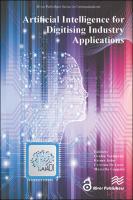Artificial Intelligence for Digitising Industry – Applications
Proposal review
Contributor(s)
Vermesan, Ovidiu (editor)
Collection
EU collectionLanguage
EnglishAbstract
This book provides in-depth insights into use cases implementing artificial intelligence (AI) applications at the edge. It covers new ideas, concepts, research, and innovation to enable the development and deployment of AI, the industrial internet of things (IIoT), edge computing, and digital twin technologies in industrial environments. The work is based on the research results and activities of the AI4DI project, including an overview of industrial use cases, research, technological innovation, validation, and deployment. This book’s sections build on the research, development, and innovative ideas elaborated for applications in five industries: automotive, semiconductor, industrial machinery, food and beverage, and transportation. The articles included under each of these five industrial sectors discuss AI-based methods, techniques, models, algorithms, and supporting technologies, such as IIoT, edge computing, digital twins, collaborative robots, silicon-born AI circuit concepts, neuromorphic architectures, and augmented intelligence, that are anticipating the development of Industry 5.0. Automotive applications cover use cases addressing AI-based solutions for inbound logistics and assembly process optimisation, autonomous reconfigurable battery systems, virtual AI training platforms for robot learning, autonomous mobile robotic agents, and predictive maintenance for machines on the level of a digital twin. AI-based technologies and applications in the semiconductor manufacturing industry address use cases related to AI-based failure modes and effects analysis assistants, neural networks for predicting critical 3D dimensions in MEMS inertial sensors, machine vision systems developed in the wafer inspection production line, semiconductor wafer fault classifications, automatic inspection of scanning electron microscope cross-section images for technology verification, anomaly detection on wire bond process trace data, and optical inspection. The use cases presented for machinery and industrial equipment industry applications cover topics related to wood machinery, with the perception of the surrounding environment and intelligent robot applications. AI, IIoT, and robotics solutions are highlighted for the food and beverage industry, presenting use cases addressing novel AI-based environmental monitoring; autonomous environment-aware, quality control systems for Champagne production; and production process optimisation and predictive maintenance for soybeans manufacturing. For the transportation sector, the use cases presented cover the mobility-as-a-service development of AI-based fleet management for supporting multimodal transport. This book highlights the significant technological challenges that AI application developments in industrial sectors are facing, presenting several research challenges and open issues that should guide future development for evolution towards an environment-friendly Industry 5.0. The challenges presented for AI-based applications in industrial environments include issues related to complexity, multidisciplinary and heterogeneity, convergence of AI with other technologies, energy consumption and efficiency, knowledge acquisition, reasoning with limited data, fusion of heterogeneous data, availability of reliable data sets, verification, validation, and testing for decision-making processes.
Keywords
Health systems and services; Energy; Communications engineering / telecommunicationsDOI
10.1201/9781003337232ISBN
9781000794311, 9788770226646, 9781003337232, 9781000794311Publisher
Taylor & FrancisPublisher website
https://taylorandfrancis.com/Publication date and place
2021Grantor
Imprint
River PublishersClassification
Health systems and services
Energy
Communications engineering / telecommunications


 Download
Download